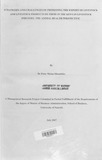| dc.description.abstract | Strategies are important and can be found at all levels of the organization. All types of
enterprises need business strategies to give them direction and purpose. They need strategy to
deploy resources in the most effective manner as well as coordinating the stream of decisions
made by different members of the organization. Without strategy an enterprise is like a ship
without radar to give direction. Firms in the livestock industry operate in highly competitive
niche markets. The markets at which they operate are crowded and majority of other players
compete to produce and sell similar livestock and livestock products. Despite the gloomy
scenario, 79.6% of exporting livestock Firms are locally owned. This indicates that they have
strategies in place for their survival. The study set out to investigate the specific livestock and
livestock products exports promotion strategies they use. The study also sought to investigate the
challenges the livestock and livestock products export Firms encounter.
The cross-sectional population survey design was used to collect data. The survey was used due
to the size of the different categories of exporting Firms and need to make comparisons at same
point in time. The findings found that Firms in the livestock and livestock products exports use
various promotion strategies such as personal selling, internet, sales promotion, advertising and
mass communication. The findings further indicate that the exporting firms operate on a
challenging environment. The major challenge is the livestock disease control in Kenya. This has
a strong bearing on achievements of optimal health (sanitary) standards required to promote
exports.
The study further found out that other Tariff and non-Tariff barriers to the livestock and
livestock products export trade exist. To address non-Tariff health (sanitary) related barriers, the
WTO‟s Sanitary and Phyto sanitary Measures (SPS Agreement) that came into force in January
1995 delegates this to a competent authority, the World Animal Health Organization through the
respective nations‟ competent veterinary authorities. The aim here is to minimize the negative
effects of unjustified health barriers to international trade (OIE terrestrial code, 2005). It would
be important that policy makers come up with polices geared to achieve the required standards
which is a prerequisite to effective promotion strategies. It would be important to inculcate a
political good will which will anchor livestock and livestock products exports in the pro-poor
policies. | en |

